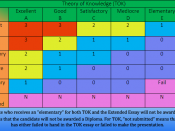It is evident that academic programmes leading to continued study at the tertiary level of education are not for all students. Preparation of the learner for the world of work is approached in different ways in different countries. Contrasts exist between the perceived importance and provision of vocational education in different national systems. In some systems (such as the German Abitur) a distinction is made between contrasting 'academic' and 'vocational' programmes, but in other systems learners are given the opportunity to follow mixed programmes that bring together these approaches. Historically, in some countries, such as France, the responsibility for vocational education has been placed with the national education system (Prost, 2000), but other systems, such as England and Wales, 'lost sight of the real purpose of work-based learning by demonizing the role of employers, downgrading the concept of vocationalism, falsely elevating the worth of education institutions as sites of learning and under-estimating the capacity of young people to develop as learners if they leave education after the compulsory stage' (Unwin, 1997:76).
The division between 'academic' and 'vocational' dimensions of education has been recognized in England and Wales, and steps taken to address it through recent initiatives including Curriculum 2000 (QCA, 1999), the Green Paper in England and in Wales the Welsh Baccalaureate, are discussed elsewhere in this volume.
An inclusive baccalaureate qualification that makes claims for breadth and balance might, it is argued, be expected to comprise elements of academic and vocational education supplemented by a programme of education in key skills.
Balance in assessment
The nature, timing and outcomes of assessment of learning also vary between different curricula. In some systems all subjects are assessed, while in others there are non-assessed subjects. This leads to a question concerning the extent to which non-assessed subjects are de facto non-subjects in...


